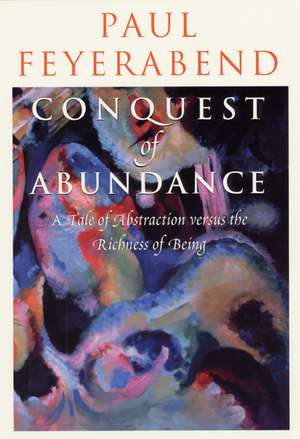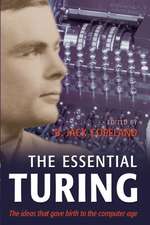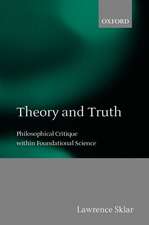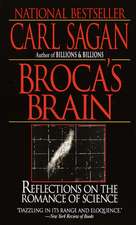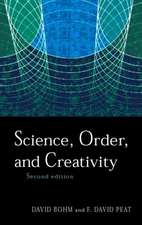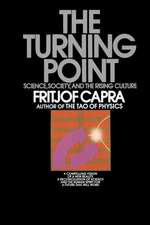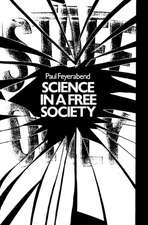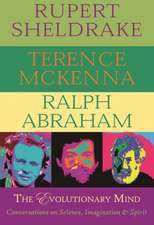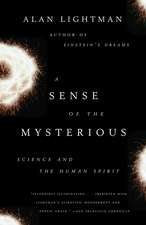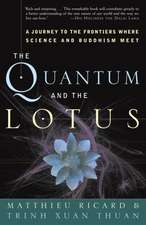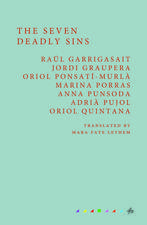Conquest of Abundance: A Tale of Abstraction versus the Richness of Being
Autor Paul Feyerabend Editat de Bert Terpstraen Limba Engleză Paperback – 3 iun 2001
From flea bites to galaxies, from love affairs to shadows, Paul Feyerabend reveled in the sensory and intellectual abundance that surrounds us. He found it equally striking that human senses and human intelligence are able to take in only a fraction of these riches. "This a blessing, not a drawback," he writes. "A superconscious organism would not be superwise, it would be paralyzed." This human reduction of experience to a manageable level is the heart of Conquest of Abundance, the book on which Feyerabend was at work when he died in 1994.
Prepared from drafts of the manuscript left at his death, working notes, and lectures and articles Feyerabend wrote while the larger work was in progress, Conquest of Abundance offers up rich exploration and startling insights with the charm, lucidity, and sense of mischief that are his hallmarks. Feyerabend is fascinated by how we attempt to explain and predict the mysteries of the natural world, and he looks at the ways in which we abstract experience, explain anomalies, and reduce wonder to formulas and equations. Through his exploration of the positive and negative consequences of these efforts, Feyerabend reveals the "conquest of abundance" as an integral part of the history and character of Western civilization.
Prepared from drafts of the manuscript left at his death, working notes, and lectures and articles Feyerabend wrote while the larger work was in progress, Conquest of Abundance offers up rich exploration and startling insights with the charm, lucidity, and sense of mischief that are his hallmarks. Feyerabend is fascinated by how we attempt to explain and predict the mysteries of the natural world, and he looks at the ways in which we abstract experience, explain anomalies, and reduce wonder to formulas and equations. Through his exploration of the positive and negative consequences of these efforts, Feyerabend reveals the "conquest of abundance" as an integral part of the history and character of Western civilization.
Preț: 184.99 lei
Nou
Puncte Express: 277
Preț estimativ în valută:
35.40€ • 37.06$ • 29.29£
35.40€ • 37.06$ • 29.29£
Carte disponibilă
Livrare economică 17-31 martie
Livrare express 28 februarie-06 martie pentru 24.98 lei
Preluare comenzi: 021 569.72.76
Specificații
ISBN-13: 9780226245348
ISBN-10: 0226245349
Pagini: 303
Ilustrații: 15 halftones, 7 line drawings
Dimensiuni: 152 x 229 x 33 mm
Greutate: 0.39 kg
Ediția:1
Editura: University of Chicago Press
Colecția University of Chicago Press
ISBN-10: 0226245349
Pagini: 303
Ilustrații: 15 halftones, 7 line drawings
Dimensiuni: 152 x 229 x 33 mm
Greutate: 0.39 kg
Ediția:1
Editura: University of Chicago Press
Colecția University of Chicago Press
Notă biografică
Paul Feyerabend (1924-94) held numerous teaching posts throughout his career in Europe and the United States. Among his books are Against Method; Science in a Free Society; Farewell to Reason; and Killing Time: The Autobiography of Paul Feyerabend, the last published by the University of Chicago Press.
Cuprins
Acknowledgments
Preface
A Note on the Editing
Part One: The Unfinished Manuscript
Introduction
1. Achilles' Conjecture
2. Xenophanes
3. Parmenides and the Logic of Being
Interlude: On the Ambiguity of Interpretations
4. Brunelleschi and the Invention of Perspective
Part Two: Essays on the Manuscript's Themes
1. Realism and the Historicity of Knowledge
2. Has the Scientific View of the World a Special Status Compared with Other Views?
3. Quantum Theory and Our View of the World
4. Realism
5. Historical Comments on Realism
6. What Reality?
7. Aristotle
8. Art as a Product of Nature as a Work of Art
9. Ethics as a Measure of Scientific Truth
10. Universals as Tyrants and as Mediators
11. Intellectuals and the Facts of Life
12. Concerning an Appeal for Philosophy
Preface
A Note on the Editing
Part One: The Unfinished Manuscript
Introduction
1. Achilles' Conjecture
2. Xenophanes
3. Parmenides and the Logic of Being
Interlude: On the Ambiguity of Interpretations
4. Brunelleschi and the Invention of Perspective
Part Two: Essays on the Manuscript's Themes
1. Realism and the Historicity of Knowledge
2. Has the Scientific View of the World a Special Status Compared with Other Views?
3. Quantum Theory and Our View of the World
4. Realism
5. Historical Comments on Realism
6. What Reality?
7. Aristotle
8. Art as a Product of Nature as a Work of Art
9. Ethics as a Measure of Scientific Truth
10. Universals as Tyrants and as Mediators
11. Intellectuals and the Facts of Life
12. Concerning an Appeal for Philosophy
